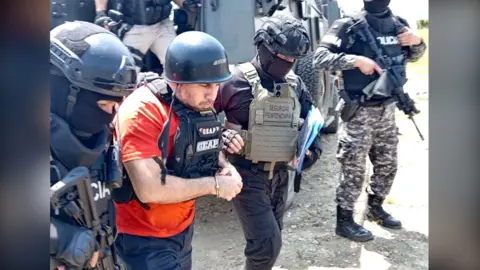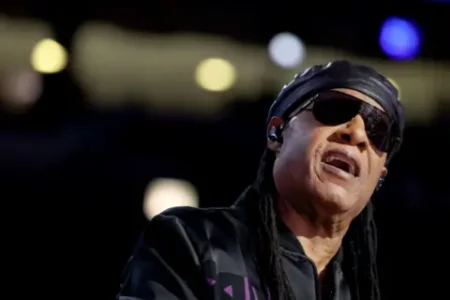In a significant development in the world of organized crime and international law enforcement, Adolfo Macías Villamar, the notorious Ecuadorian drug lord widely recognized as “Fito,” has been extradited to the United States to face serious charges including drug and arms trafficking. The extradition marks a critical moment in Ecuador’s ongoing battle against rampant crime and drug trafficking, as Fito is a leading figure in the Los Choneros gang, an organization that has been linked to escalating violence and criminal activities in the country.
Fito’s path to extradition has been tumultuous. He was originally captured in June 2024, nearly a year after his dramatic escape from a high-security prison where he was serving a 34-year sentence for a series of criminal offenses. Following his recapture, he was held in La Roca, Ecuador’s maximum security facility. His impending court appearance in a Brooklyn federal court next week is highly anticipated, where it is expected he will plead not guilty to the international charges associated with trafficking drugs and weapons, as asserted by his attorney, Alexei Schacht.
As the former leader of Los Choneros, Fito’s impact on Ecuador’s criminal landscape cannot be overstated. Under his command, the gang has gained notoriety for its connections with powerful crime syndicates situated in Mexico and the Balkans. Moreover, Fito’s alleged involvement in orchestrating political assassinations, including the killing of presidential candidate Fernando Villavicencio in 2023, has drawn significant attention not only nationally but internationally. This incident underscores the deep entrenchment of organized crime in Ecuadorian society and politics.
Ecuador’s transformation from a once-glimmering tourist destination to a hotspot for violence and crime has been largely attributed to the activities of gangs like Los Choneros. The nation now grapples with one of the highest murder rates in the region. Presently, over 70% of the world’s cocaine production passes through this small Andean country, sandwiched between Colombia and Peru—two of the world’s largest cocaine producers.
Fito’s recapture in June, once again highlighted the Ecuadorian law enforcement’s efforts to combat organized crime. Authorities tracked him down to an underground bunker beneath an upscale residence in Manta, a coastal city. The country’s authorities managed to apprehend him with assistance from various security forces. Following his extradition, President Daniel Noboa expressed gratitude towards law enforcement for their role in capturing Fito, and confirmed that he would be extradited to the United States to face justice.
On the day of his extradition, Ecuador’s prison authority confirmed that Fito was handed over to American officials prior to being flown out of the country. This unfolding scenario comes on the back of a referendum held in Ecuador where citizens voted in favor of allowing the extradition of their own nationals to foreign jurisdictions for trial, a pivotal shift in the country’s approach to tackling organized crime. President Noboa has firmly pledged to pursue rigorous measures against crime, even suggesting military cooperation with foreign nations like the United States and Brazil in combating these criminal gangs.
In conclusion, Fito’s extradition to the United States epitomizes the intensified international collaboration against transnational crime. As he stands trial in the United States, many await with bated breath to see if justice will prevail in dismantling the robust networks of drug trafficking that span across borders. Despite the challenges ahead, the efforts by Ecuadorian authorities signal a commitment to reclaiming public safety and lawfulness amidst increasing lawlessness.











